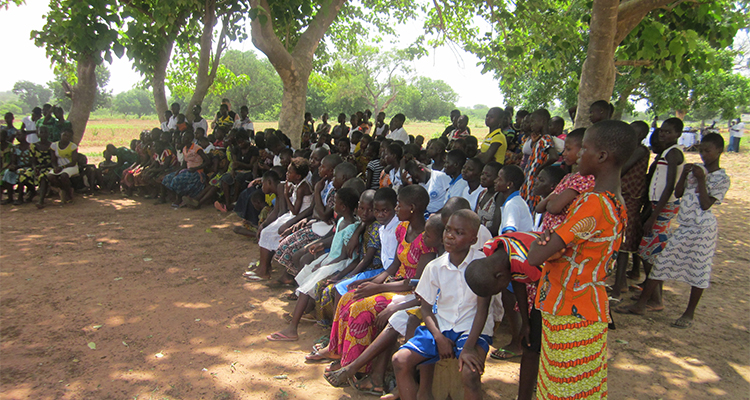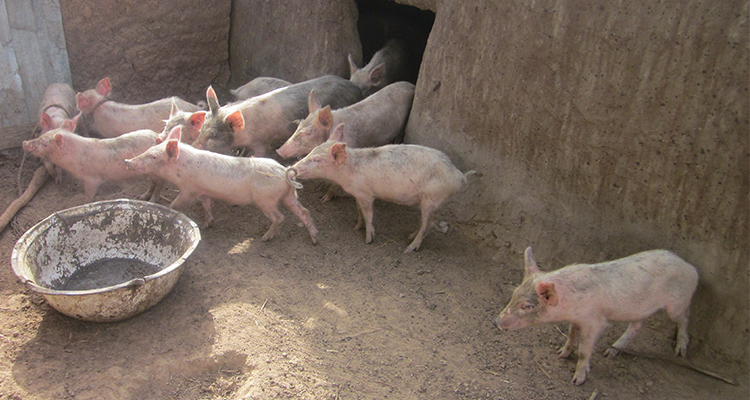
For girls, by girls: Youth-led justice club changes future for hundreds

In Sumprecia Yaro’s rural village in northeastern Ghana, educating girls is typically frowned upon.
“Right from childhood, the girls are made to believe that higher education makes it difficult or impossible for a girl to have a husband,” Sumprecia says.
In fact, there are a lot of things girls and women aren’t allowed to do in her village. They are not considered equal to men and, therefore, can’t make important decisions or inherit property. Those who choose to go to school have to scrape together funding on their own. Girls are expected to marry and devote their entire lives to supporting and serving their husband, children, and extended family. Very often, they have no choice in the matter.
“Girls are given out to marriages arranged by parents or as a gift to friends,” Sumprecia explains. “Women are advised to always obey, [and] men are allowed to discipline their wives just like their kids.”
Sumprecia grew up in Yapala, a small farming village. She was one of 17 children, including her siblings and half-siblings from her father’s two wives. When she was old enough for grade 1, she started following her friends to school. Although she was not enrolled, the teachers encouraged her to stay. Eventually, she started doing any kind of farming activities and odd jobs she could find to pay the school fees and enroll officially.
Her mother helped as much as she could, but by the time Sumprecia was qualified for high school, funds had dried up. In her village, it’s common for men to offer to help girls pay for school, but repayment is expected in the form of sexual favors. Exploitation is prevalent, and so is teen pregnancy.
“Only a few brave mothers will try to educate the girl child to the first basic educational level,” Sumprecia says. “Most girls drop out or become pregnant before grade 9.”
Without funding, Sumprecia sat out of school for three years, even though she was qualified for high school. Longing to finish her education, the teenager boldly approached the pastor of the local Nazarene church she attended to ask for help. He directed her to the denomination’s district superintendent, a man who had grown up in a different community and culture and was happy to work with her on ways to finish her education.
Sumprecia’s first-year high school fees were paid by a compassion fund the district had set up, and she also received two pigs to raise. The profits that the pigs and their progeny generated allowed her to finish school without having to turn to men who would exploit her.
Through the church’s support, Sumprecia became the first educated girl in her family. She says that the Nazarene superintendent encouraged her to keep up with her classes and never think of quitting. He even suggested that through her efforts, other girls could be empowered to believe they could succeed.
“For the first time, I felt like I am capable of doing something good, and could do more,” she says.

A dream of justice
Sumprecia’s feeling that she could do more wasn’t just a passing notion. She went on to found the Nazarene Girls for Justice Club as a way to equip and empower other girls.
Sumprecia knew her story wasn’t unique. She also knew that many girls weren’t as fortunate as she was: when they left school, they often didn’t get to go back. She says God began to speak to her about forming a club to support other girls the way she had been supported.
“I had a lot of encouragement to dream of living and doing anything that men could do because I am not a lesser human being,” Sumprecia says. “I always find ways to share this same dream with other girls and to encourage them.”
In 2009, the dream God gave her for the justice club came to fruition. Since then, young women have been coming together to create tangible solutions for the problems they face.
At first, running the club wasn’t smooth. In order to garner the respect and support of the men in the community, leadership of the club was given to a man in the beginning. This generated a lot of tension—how would the young women learn to accomplish things themselves if they weren’t allowed to lead? Still, they didn’t let the awkwardness stop them. Sumprecia, along with 14 other girls who had similar stories, came together to start the first club.
“We freely discussed our issues and found ways to respond with biblical teachings and prayers,” Sumprecia says.
After about a year, the church leadership helped the club transition its structure. Now, the club functions independently under the leadership of young women. Nazarene district leadership continues to provide support in the form of mentoring and leadership training opportunities, as well as finances for larger project proposals. The church leaders also engage with local police when legal justice is needed for specific situations in the lives of the girls, such as sexual assault.
The club hasn’t just continued to function; it has exploded. The original club with 15 members has grown to more than 750 members, plus others who aren’t yet registered officially. The club consists of groups who meet across four zones in 11 different communities. The groups meet on the first Saturday of each month, and the local group leaders also meet together every three months. Once a year, all members are invited to a club-wide gathering at a central location.
While the Nazarene Girls for Justice Club was born out of a local Nazarene church and still bears its name, girls from other denominations and even other faith traditions are also welcome. Any girl who is facing an injustice herself or wants to help others address injustice can join.

Aiming high
The support the club provides is multi-faceted and seemingly endless. Together, members contribute “love offerings” during their meetings and manage a bank account where funds for their ministry are kept.
They use these funds to address real-life problems girls are experiencing. One of the most successful activities of the club has been running a piggery to help girls continue their education. The members work together to raise pigs. When a girl receives a pig, she is able to sell the piglets to cover school expenses, in the same way Sumprecia did when she continued her high school education. Recently, the piggery was destroyed by a storm, so they are now working to raise the 5,600 Cedi ($1,265 USD) needed to reestablish their herd. This time, they plan to build a sturdier structure.
The club has a farm where peanuts, maize, and rice are grown to earn additional income for club projects. They also buy sewing machines and provide vocational training for girls who want to learn a trade. In addition, they invite women who have found professional success to speak, and they organize specialists to come teach various skills.
Sumprecia notes that this approach is working.
“The club empowers girls and encourages them to aim high in life,” she says. “Many people have seen the fruits of the club. Girls graduate and are now gainfully employed or learn a trade and are now leading in training others.”
Since the club’s inception, more than 450 girls have either completed high school or learned a vocational skill to support themselves. Many have also gone beyond high school, including Sumprecia, who studied medicine and now works as a nurse.
In addition to coming up with practical ways to meet tangible needs and helping girls stay out of exploitative situations, the club also works to address emotional and spiritual concerns. They start by making sure members understand and experience the love of God, and they talk a lot about living in a Christian relationship before marriage and when married.
“We have helped more than 1,700 girls to have a positive view of themselves and to live a biblical, moral right life,” Sumprecia says. “I am proud to say, teenage pregnancy and teenage marriages have reduced significantly from 90 percent to 20 percent in the areas we serve.”

Doing more
While the clubs still do not see strong support from men in the community, more women are getting involved. Mothers are changing their ideas about the importance of school for girls, and more often than not, now hope their daughters attend, rather than discouraging it.
The girls who are involved in the club are pioneers: no other women have taken on the responsibilities of leadership the way they have. As members graduate, they become community leaders, teachers, wives, mothers, and more. And because of the Nazarene Girls for Justice Club, they will teach their peers and daughters that they can do more, that they can dream more.
Esther first learned about the club when its leaders helped a 13-year-old girl in her community avoid an arranged marriage. When Esther learned about the training, support, and justice work they were doing, she decided to join.
As part of the club, she was able to continue her own education.
“I was thrown out of class because I could not pay my fees,” Esther explains. “The club helped me with two piglets, and now I have been able to take care of my school needs.”
Not only did she finish primary school and high school, but Esther is now studying at a teacher training college.
“I love this club,” she says.
--Republished with permission from the Winter 2017 edition of NCM Magazine



